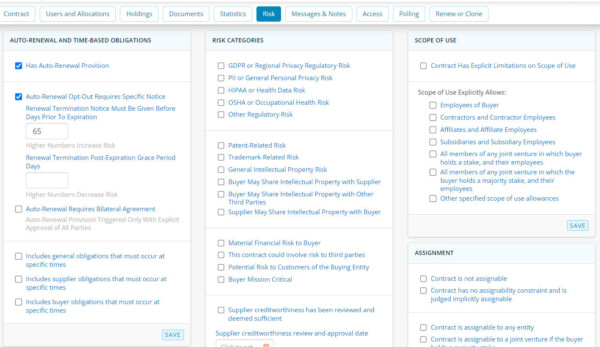Cost control can get out of hand quickly: in the blink of an eye, your organization can become needlessly committed to tens of thousands of wasted dollars that would have brought real value elsewhere. But if you learn to spot the patterns behind wastage you can make the necessary systemic changes to stop it.
One of these patterns is contract auto renewals. Time and time again we see clients caught by autorenewal clauses in subscription contracts, and forced to pay large sums for a subscription license they no longer need.
What can you do to avoid getting caught out by auto renewal? Start with awareness – and learn to manage it better. Keep reading to see how auto renewal sneaks into contracts, what your company can do about it – and how Couranto Clarity can manage the auto renewal process for you to save you money.
Why auto renewal is commonplace
A typical auto renewal clause states that the counterparty agrees to renew the license agreement unless notice is given within a set timeline – e.g. 90 days before contract expiration. Vendors include auto renewal clauses in contracts for a variety of reasons: for service continuity, to simplify contract management, and to ensure revenue stability.
The problem is that organizations often just don’t know, or forget, that there is an auto renewal clause in their license agreements. End users rarely worry about contract fine print beyond the fees they agree to, and unless it’s a major contract involving five or six figures, chances are that the company’s legal team won’t review it in detail either.
Vendors can also do a good job of hiding auto renewal clauses in the sign-up process, so end users will simply miss the fact that they’ve signed up to a recurring commitment because it’s buried in terms and conditions that are a few clicks deep.
If you fail to cancel before the deadline the vendor will most likely insist on payment and if necessary, may well contractually enforce payment in court.
Yes, it’s possible to insist that a contract does not include an auto renewal agreement, but you’d need to do so during the contract negotiation process and – commonly – it just doesn’t happen. Besides, the vendor isn’t likely to offer a custom contract if it's a large vendor or a small agreement.
That’s why, in practice, companies have autorenewal clauses embedded in many of their information contracts.
Options for managing auto renewal
There are a couple of ways to manage autorenewals. One way of course is to just keep track of auto renewals in a spreadsheet, or another data repository. If it’s a large multi-year contract, the contract owner will also (presumably) be on top of negotiating a renewal or canceling the contract before auto renewal.
But this process can quickly fall apart. Staff changes are the biggest culprit because it leads to coordination breakdown. The list of auto renewal obligations can easily get lost in the transition, and contracts can become “orphaned” with no real owner to look after the contract until renewal time – when it’s too late to prevent the autorenewal from taking effect.
Here’s another approach: for every new contract, trigger the cancellation process as soon as the contract is in place. There’s then no risk that the contract will “accidentally” renew.
There is, however, a risk that the user will find that their service is disrupted upon notification, or at the end of the contract, for a couple of weeks. So, unless it’s managed perfectly, automatically canceling before renewal isn’t an ideal solution either.
Managing auto renewals in Couranto Clarity
We’ve previously explained why it’s a good idea to do your record-keeping within Courant Clarity instead of using spreadsheets, and the argument also holds for auto renewal.
Couranto Clarity has a built-in feature that targets auto renewals – including the ability to set up alerts, notifications and reminders to help you make sure your team is up to speed with renewal obligations.
When you add a new agreement to Couranto Clarity you register all the details of a contract including its start and end date. You can then add further details that define the auto renewal aspect of the agreement – including your intention to renew the contract, and when the last day is to give notice not to renew the contract.

Clarity will then automatically track the notice period for you, including sending alerts that prompt your team to cancel a subscription before it auto-renews. This internal notification period also gives you the time to find the usage data that could help you to convince stakeholders to budget for renewal, if you wanted to renew.

Clarity also provides on-demand reports of all auto-renewal agreements. This report can be filtered or sorted by any field, and scheduled to run automatically and pushed to administrator inboxes, to provide a heads-up lift of all auto-renewal action items for the coming month or quarter.
Another use of this report could be something like this: “Select contracts managed by an administrator who has left the company, identify those contracts at risk for lapse or identify those with autorenewal clauses, and run a report of those contracts listing all seated users.” Does that seem like a useful report?
Don’t let autorenewal turn into wasteful spending
Just recently at Couranto, we noticed a couple of incidents where an associate had a long-standing agreement with a vendor that was signed years ago: the agreement auto-renewed every year, which was fine for a while… yet, when the associate left, nobody knew about the autorenewal. That resulted in a significant, unwanted charge.
Watching out for autorenewal and managing it carefully – by monitoring autorenewal through Couranto Clarity for example – can save your company significantly.
Would you like to know more about how Couranto can help you manage information spend? Reach out to us here.
Courano is a WBENC and Disability:iN certified diverse company with more than 30 years experience in corporate information contract management, Couranto serves clients globally with strategic programs that maximize the value of information portfolios by reducing costs while improving access to licensed content, data resources, intellectual property, corporate memberships and related contracts. Couranto’s Discovery and Clarity platforms provide custom-configured end-to-end information access, budget planning and license management tools. Built on deep expertise and a long history of client successes, Couranto solutions add value to your information and help drive innovation throughout your organization, creating enduring impact.
